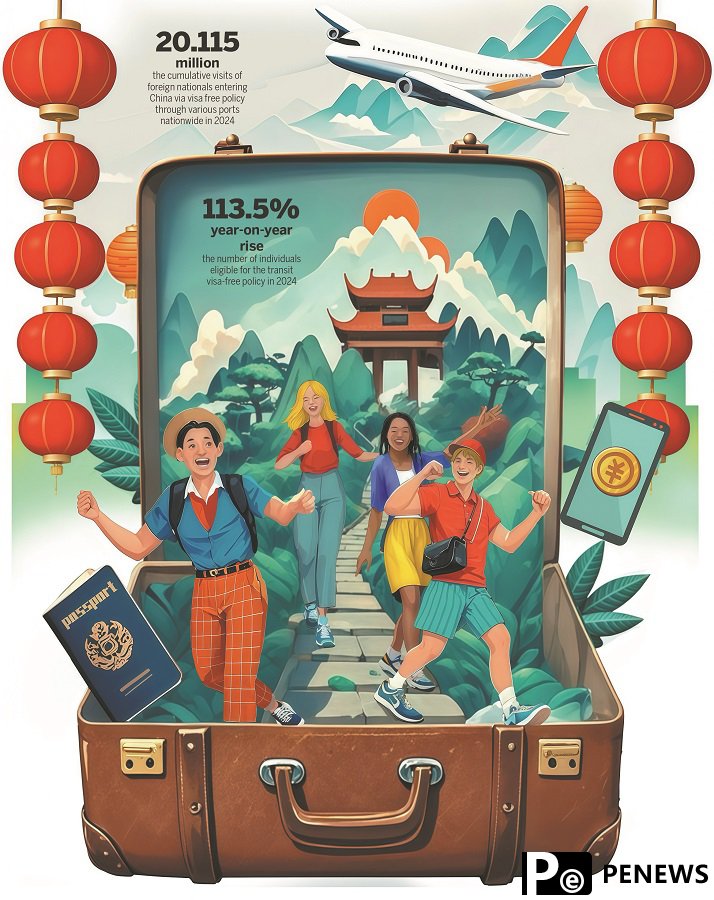Home>>
Inbound tourism surges amid relaxed policies(China Daily) 16:23, February 17, 2025

MA XUEJING/CHINA DAILY
Zhang Miao, who is currently preparing to host her husband's family from France, is being inundated with Travel in China advertisements on social media platforms.
The array of services and activities offered by major online travel platforms like Trip.com and Fliggy as well as individual operators and part-time students, with prices ranging from around 300 yuan ($41) to several thousand yuan per day, has left the 40-year-old feeling overwhelmed.
Last year, favorable policies like the 240-hour visa-free transit option has significantly boosted inbound tourism, injecting new vitality into the tourism industry.
According to the latest data from the National Immigration Administration, the number of foreign visits entering China via the visa-free policy through various ports nationwide reached 20.115 million in 2024, marking a 112.3 percent year-on-year increase.
Among these, the number of individuals eligible for the transit visa-free policy rose 113.5 percent year-on-year.
Estimates by financial services provider Morgan Stanley show that inbound tourism is expected to generate cumulative revenues of between $1.7 trillion and $4.5 trillion for China over the next decade, with its contribution to the nation's GDP expected to rise to about 2-4 percent in 10 years.
Against this backdrop, online travel platforms have been rolling out initiatives to cater to the greater influx of inbound tourists.
Trip.com has established an inbound tourism services platform offering bookings for hotels and tourist attractions, mobile payments and communication-related services.
Fliggy, in collaboration with Alipay, has launched activities like the "China Travel Flight Plan" to provide conveniences and discounts for visitors to China.
Simultaneously, bilingual guides specialized in serving foreign visitors have become highly sought after. In Fujian province, for instance, the number of applicants for foreign language tour guides increased by over 180 percent year-on-year to 531 last year, data from the local government showed.
Yet, the country faces a shortage of foreign language guides, particularly those skilled in less common languages, said Sun Guizhen, head of the tour guide committee at the China Association of Travel Services.
Among about 660,000 licensed tour guides in China, only 8.4 percent are fluent in foreign languages, Sun said.
The family of Zhang's husband, comprising over 10 members, decided to make a short trip to China, attracted by the favorable visa policy.
Zhang soon identified a startup team on social media.
Despite the high rates — over 1,000 yuan per day just for a guide — plus additional expenses for car rentals and overtime costs for staff, the small team seemed to have guides juggling multiple roles, constantly fielding calls and messages from foreign tourists inquiring about inbound travel.
Zhang said she chose this team because of their full-service approach, which eliminated concerns about language barriers and payment inconveniences and offered customized itineraries and other tailored services. This was particularly of interest to her foreign in-laws.
The team leader of Zhang's travel group, Zhang Yang, is a graduate in arts management with an educational background in the United Kingdom.
Compared to Chinese tourists, he said foreign visitors are more easily drawn to plans featuring "authentic experiences" and "cultural tours". Consequently, their specialized services often include activities such as hutong (alley) tours and intangible cultural heritage experiences.
Zhang Yang said his order volume surged by over half in December, with projected earnings reaching new highs.
About a year ago, he worked for an advertising company, but stumbled upon the trending "Travel in China" topic on Douyin by chance, where he discovered that the monthly influx of people from certain foreign countries to China had far exceeded expectations and was steadily increasing.
Recognizing the opportunity, he quit the advertising agency and joined the current travel startup, in which he sees great development potential.
In the first week at his new job, Zhang posted a video showcasing the beauty of Zhangjiajie in Central China's Hunan province on Douyin's overseas sibling TikTok. The video quickly garnered over a million views and resulted in hundreds of inquiries and private messages.
The just concluded Chinese New Year, which ran from Jan 28 to Feb 4, also ushered in a small peak for inbound travel of foreign tourists.
Zhou Huijie, a researcher at Trip.com Group, said: "Cities near the 25th parallel north have become golden destinations for Spring Festival travel due to their favorable temperatures and intangible cultural heritage projects. While Chinese nationals traveled overseas during the festival, foreigners came to China to celebrate Chinese New Year."








